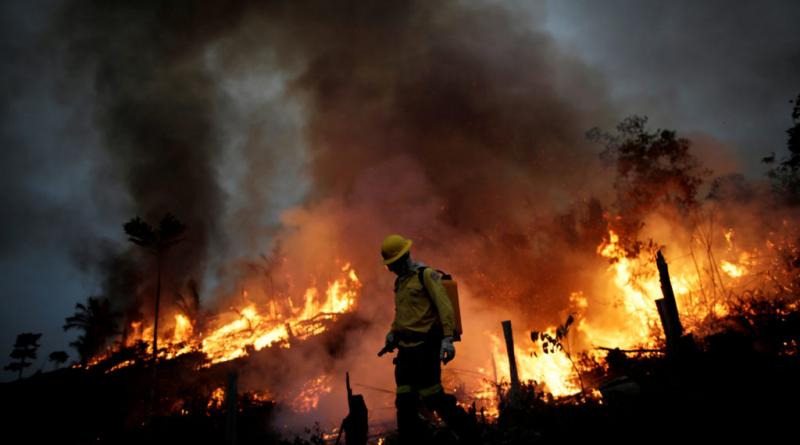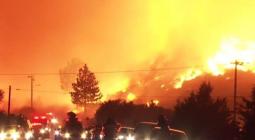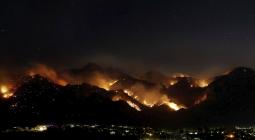Climate change is driving wildfires, giving ‘rocket fuel’ to tropical storms.

As hundreds of wildfires in California continue to blaze and thousands of people evacuate, this year’s hurricane season is on track to become one of the busiest on record. Andrew Freedman, editor of Washington Post’s Capital Weather Gang joins Hari Sreenivasan to discuss how climate change is aiding these natural disasters and what can be done about it.
WATCH THE VIDEO HERE
Listen to this Segment
Read the Full Transcript
-
Hari Sreenivasan:
The last two decades have seen an increase in the number and intensity of both wildfires–like those currently burning in California and tropical storms, with this year's hurricane season on track to be one of the busiest on record.
I recently spoke with Andrew Freedman, editor for the Capital Weather Gang at the Washington Post about how climate change is contributing to this growth and what can be done about it.
-
Andrew Freedman:
Climate change is having a very clear and significant impact on wildfire size wildfire patterns in California. And you're seeing more extreme fire behavior now than you did before. So we're seeing more unpredictable conditions on fire lines. It's more dangerous for firefighters. We're seeing more weird things like fire, tornadoes, for example. All of this points in the direction of having more extreme fire days.
-
Hari Sreenivasan:
It's hard for people to imagine that a half a degree or one degree change in the climate makes these things worse. How is it connected?
-
Andrew Freedman:
When you look at what it does if you shift the probability distribution of extreme events, you are dramatically increasing the odds of extreme heat events so heat waves being more frequent and more severe, longer lasting.
Some experts that I was speaking to about this event were saying that it kind of made temperatures across California at least two to four degrees Fahrenheit above what it would have been without climate change. So this is just tilting the odds in favor of these types of events even more than you would expect from just a little over a one degree Fahrenheit increase in temperature.
-
Hari Sreenivasan:
Taking that half degree or one degree and putting all of that energy, for example, into the ocean changes the potential for storms. And we're living through, at least this year, a very active tropical storm and hurricane season already.
-
Andrew Freedman:
Yeah, it's a record season for tropical storm season in the Atlantic already. And part of that is due to natural climate variability, which favors a multi-decade old string of active seasons, but not all of it.
The Atlantic sea surface temperatures are so much warmer than average right now. That part of that is due to climate change. So instead of giving just regular gasoline to these storms, you're essentially giving them rocket fuel where if atmospheric conditions are right, they will rapidly intensify and potentially catch coastal residents off guard.
-
Hari Sreenivasan:
It's great for swimmers to be able to get into warmer water, but pretty much otherwise the entire ecosystem in the water changes. I mean, you've got kind of the surface level concern on the tropical storms and then you've got what's happening beneath that's also affected.
-
Andrew Freedman:
You know, one of the things that's been happening is the increased frequency and severity of marine heatwaves. So we think of heat waves on land, but that they're actually occurring in the water as well. And we've been seeing that especially off the east coast of the US this year, fish that normally you'd see, you know, off the coast of Florida are showing up in Cape Cod and Fire Island.
-
Hari Sreenivasan:
How much can we actually do to mitigate the changes that we are seeing and also living through? Because we've seen these forecasts that there is a limited amount of time where we've crossed some sort of a tipping point where it doesn't matter if we could possibly get it down to half a degree lower or one degree lower.
-
Andrew Freedman:
Climate change really isn't about some cliff that you fall off of. There's always choices that we can make. Top scientists that I speak with are always saying, you know, it's really about what kind of consequences in terms of how severe we want them to be.
That determines when we start making the changes in terms of cutting greenhouse gas emissions and how significantly we make those cuts. If we do it earlier, it's cheaper to do. And the consequences are less severe a couple of decades down the road.
-
Hari Sreenivasan:
Andrew Freedman of the Washington Post, thanks so much.
-
Andrew Freedman:
Thanks for having me.
23 August 2020
PBS




